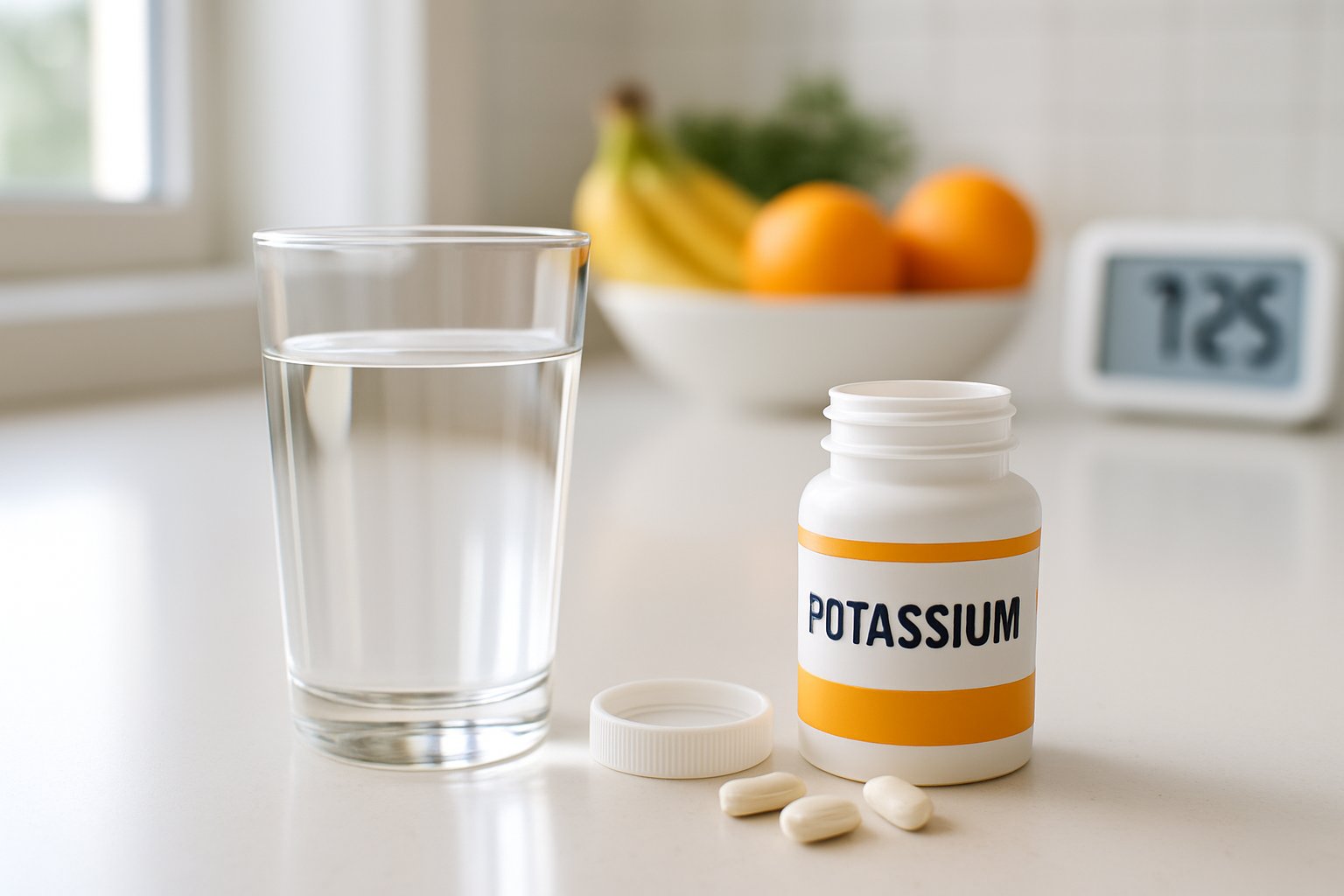Take potassium supplements with meals to improve absorption and reduce stomach irritation. Exercise timing and sweat levels can influence when potassium supplementation is most beneficial. Individual health conditions and medications may affect the optimal timing for potassium intake.
Potassium plays a vital role in muscle function, nerve signaling, and maintaining healthy blood pressure levels. Many people take potassium supplements to support their cardiovascular health and prevent deficiencies, but timing can affect how well the body absorbs this essential mineral.

The best time to take potassium is with meals or immediately after eating, as food helps reduce stomach irritation and improves absorption. Taking potassium on an empty stomach can cause nausea and digestive discomfort for many people. The body also absorbs potassium more effectively when it’s consumed alongside other nutrients found in food.
Individual factors like exercise habits, medical conditions, and other medications can influence the optimal timing for potassium supplementation. People who exercise regularly may benefit from taking electrolytes before, during, or after workouts[1] depending on their sweat levels and workout intensity. Understanding these factors helps people maximize the benefits of their potassium intake while minimizing potential side effects.
When Is the Best Time to Take Potassium?

The timing of potassium intake affects how well the body absorbs this essential electrolyte. Taking potassium at specific times can help optimize blood pressure regulation and support proper cellular function.
Morning Versus Evening: Timing and Absorption
Morning intake of potassium supplements may provide the most benefits for overall health. Taking potassium in the morning helps signal daytime to red blood cells[2], which supports the body’s natural circadian rhythm.
Early morning consumption allows potassium to work throughout the day when the body needs electrolyte balance most. This timing helps maintain steady blood pressure levels during daily activities.
Evening potassium intake can benefit people who exercise later in the day. Athletes and active individuals may find that taking potassium in the evening aids muscle recovery[3] and reduces nighttime muscle cramps.
However, large doses of potassium before bed might disrupt sleep for some people. The body processes electrolytes more efficiently during waking hours.
Optimal timing depends on individual needs:
- Morning: Best for general health and blood pressure support
- Evening: Better for post-exercise recovery
- Split doses: Divide daily intake between morning and evening
Taking Potassium With Meals
Potassium supplements work best when taken with food. Taking potassium after meals maximizes absorption and helps regulate fluid balance[3] while reducing stomach irritation.
Food slows the absorption of potassium, which prevents rapid spikes in blood levels. This gradual release helps the kidneys process the mineral more effectively.
Taking potassium on an empty stomach can cause nausea, stomach pain, or diarrhea. The digestive system tolerates potassium supplements much better with food present.
Best meal pairings for potassium:
- Breakfast: Supports morning energy and electrolyte balance
- Lunch: Maintains midday hydration and muscle function
- Dinner: Aids recovery if taken after evening workouts
Large meals with moderate fat content help slow potassium absorption. This creates a steady supply of the electrolyte over several hours.
Consistency and Daily Routine for Potassium Intake
Regular daily timing produces better results than sporadic supplementation. The body maintains electrolyte balance more effectively when potassium intake follows a predictable schedule.
Setting a specific time each day helps prevent missed doses. Most people find success taking potassium supplements at the same meal daily.
Creating an effective routine:
- Choose one consistent meal time
- Set phone reminders if needed
- Keep supplements in a visible location
- Track intake for the first few weeks
Electrolytes like potassium help maintain fluid balance[1] throughout the day. Consistent timing supports this natural process.
People taking blood pressure medications should maintain especially regular potassium schedules. Consistent intake helps doctors monitor how supplements affect medication effectiveness.
Split dosing works well for people taking higher amounts of potassium. Taking half the daily dose at breakfast and half at dinner spreads absorption throughout the day.
Key Considerations and Health Impacts of Potassium Timing

Timing potassium intake affects how well the body absorbs this essential mineral and interacts with other nutrients like magnesium and sodium. Potassium-related health problems[4] can occur when levels become too high or too low, making proper timing crucial for maintaining healthy blood pressure and preventing complications.
Synergy With Magnesium and Sodium
Potassium works closely with magnesium and sodium to maintain proper fluid balance and support muscle contractions. Taking these minerals at the right times helps the body use them more effectively.
Magnesium and potassium have a special relationship. Low magnesium levels can make it harder for cells to keep potassium inside them. This means people with magnesium deficiency may need both minerals to fix potassium problems.
The timing matters because:
- Morning: Taking potassium with breakfast helps balance overnight sodium retention
- Evening: Combining with magnesium can support better muscle function during sleep
- Post-workout: Both minerals help restore what’s lost through sweat
Sodium intake affects how much potassium the body needs. High-sodium meals require more potassium to maintain balance. Taking potassium supplements 2-3 hours after salty foods helps counteract sodium’s effects on blood pressure.
Impact on Blood Pressure and Heart Health
Potassium timing directly affects cardiovascular health by influencing nerve signals and heart rhythm. The mineral helps lower high blood pressure by relaxing blood vessel walls and reducing sodium’s impact.
Morning doses work best for blood pressure control. Taking potassium with breakfast helps manage the natural morning rise in blood pressure that occurs when people wake up.
Studies show that spreading potassium intake throughout the day provides better protection against:
- Heart disease
- Stroke
- Irregular heartbeat
- Heart attacks
People with existing heart conditions should take potassium with food to avoid sudden changes in blood levels. Empty stomach doses can cause rapid absorption that may affect heart rhythm.
The timing also affects how potassium interacts with blood pressure medications. Most doctors recommend taking potassium supplements at least 2 hours apart from blood pressure pills.
Special Cases: Hypokalemia, Kidney Stones, and Medication
Certain health conditions require specific timing strategies for potassium supplementation. Hypokalemia (low potassium) often needs multiple daily doses rather than one large amount.
People with kidney stones may benefit from taking potassium citrate with meals. This form helps prevent calcium-based stones by making urine less acidic. The timing with food also reduces stomach irritation.
Medication interactions affect timing decisions:
| Medication Type | Recommended Timing | Reason |
|---|---|---|
| Diuretics | Morning with medication | Replaces lost potassium |
| ACE inhibitors | 2 hours apart | Prevents dangerous buildup |
| Insulin | With carbohydrate meals | Prevents potassium drops |
Dialysis patients need carefully timed potassium based on their treatment schedule. Most take supplements on non-dialysis days only.
Signs of Imbalance: Hyperkalemia and Low Potassium
Recognizing potassium imbalance symptoms helps people adjust timing and dosage safely. Both too much and too little potassium affect nerve function and muscle function.
Hyperkalemia (high potassium) symptoms include:
- Muscle weakness
- Heart palpitations
- Nausea
- Numbness
These often occur when people take large doses at once instead of spreading them throughout the day.
Low potassium signs include:
- Muscle cramps
- Fatigue
- Constipation
- Irregular heartbeat
Taking potassium and magnesium supplements[5] requires attention to timing to avoid these problems.
People should stop taking supplements and contact doctors if they experience chest pain, severe weakness, or breathing problems. These may signal dangerous potassium levels that need immediate medical attention.
Blood tests every 3-6 months help monitor potassium levels in people taking supplements regularly.
Frequently Asked Questions
Timing potassium supplements depends on individual health needs, exercise habits, and medication schedules. Safety considerations include proper dosing, potential drug interactions, and monitoring for side effects.
What factors determine the optimal time to take potassium supplements?
Exercise intensity and duration play key roles in determining potassium timing. Athletes who sweat heavily need potassium before, during, or after workouts to replace lost electrolytes.
Diet affects potassium absorption and needs. People eating low-sodium diets may need different timing than those consuming processed foods high in sodium.
Medical conditions influence timing requirements. Individuals taking diuretics or managing heart conditions need personalized schedules based on their doctor’s recommendations.
Climate and environment matter for timing decisions. Hot and humid conditions increase electrolyte losses[1], making supplementation more important during these periods.
Is it more beneficial to take potassium supplements in the morning or at night?
No single time works best for everyone. Morning intake may benefit people who exercise early or take medications that deplete potassium.
Evening supplementation might help those who work out later in the day. Night timing can also support muscle recovery and prevent cramping during sleep.
Splitting doses throughout the day often provides better absorption. This approach prevents stomach upset and maintains steady potassium levels.
What are the guidelines for combining potassium with other supplements such as magnesium?
Taking multiple electrolytes together improves absorption[1]. Potassium works best when combined with sodium and magnesium for proper fluid balance.
Timing all electrolytes together simplifies the routine. This approach ensures the body gets complementary minerals at the same time.
Magnesium and potassium support each other’s functions. Both minerals help with muscle contractions and nerve signaling when taken together.
How soon can one expect to see effects after starting potassium supplementation?
Effects from potassium supplements vary by individual needs and deficiency levels. People with severe deficiencies may notice improvements within days.
Muscle cramp relief often occurs within hours to days of proper supplementation. Energy levels and fatigue may improve within the first week.
Blood pressure benefits typically take several weeks to become noticeable. Consistent daily intake produces better results than sporadic supplementation.
Are there any potential interactions to consider when taking potassium with prescription medications?
Blood pressure medications can interact with potassium supplements. ACE inhibitors and potassium-sparing diuretics may cause dangerous potassium buildup.
Heart medications require careful monitoring with potassium use. Digoxin and other cardiac drugs can become less effective or more toxic.
Kidney medications pose interaction risks with potassium supplements. People with kidney disease need medical supervision before starting any potassium regimen.
What are the safety considerations for the daily intake of potassium supplements?
Daily potassium limits help prevent dangerous side effects. Most supplements contain 99 mg per dose due to safety regulations.
Kidney function affects potassium safety significantly. People with kidney problems cannot eliminate excess potassium effectively, leading to dangerous buildup.
Stomach upset occurs with high doses of potassium supplements. Taking supplements with food reduces nausea and digestive irritation.
Regular blood tests monitor potassium levels safely. Healthcare providers can adjust dosing based on blood work results and individual responses.
References
- taking electrolytes before, during, or after workouts. https://www.eatingwell.com/the-best-time-to-take-electrolytes-11775238 Accessed October 25, 2025
- New Study Suggests You Should Change the Time of Day That You Take Potassium. https://www.bulletproof.com/sleep-articles/hack-your-red-blood-cell-circadian-rhythm/ Accessed October 25, 2025
- When to Take Magnesium and Potassium Supplements: Unlocking the Best Timing for Optimal Health. https://cymbiotika.com/blogs/sleep/when-to-take-magnesium-and-potassium-supplements-unlocking-the-best-timing-for-optimal-health Accessed October 25, 2025
- Potassium: Benefits & Side Effects. https://health.clevelandclinic.org/potassium Accessed October 25, 2025
- When to Take Potassium and Magnesium Supplements: A Comprehensive Guide. https://cymbiotika.com/blogs/sleep/when-to-take-potassium-and-magnesium-supplements-a-comprehensive-guide Accessed October 25, 2025
